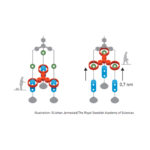 A group of European scientists won the 2016 Nobel Prize for chemistry for developing the “world’s smallest machines,” which could be used to revolutionize drug delivery.
A group of European scientists won the 2016 Nobel Prize for chemistry for developing the “world’s smallest machines,” which could be used to revolutionize drug delivery.
Jean-Pierre Sauvage, J. Fraser Stoddart and Bernard Feringer claimed the $931,000 prize (8 million Swedish crowns) for work that Feringer described as having “endless” potential, according to Reuters.
“Think of a tiny micro-robot that a doctor in the future will inject into your blood and that goes to search for a cancer cell or goes to deliver a drug, for instance,” Feringer told the news service.
“We can still only guess at the thrilling developments ahead of us,” the Nobel committee said. “However, we do have a definite answer to [the] initial question, ‘How small can you make machinery?’ – At least 1,000 times thinner than a strand of [human] hair.”
The committee likened this era of development of molecular machinery to the advent of the electric motor in the 1830s, when scientists created spinning cranks and wheels without knowing how they would drastically change fields like transportation.
Feringer is a professor of organic chemistry at the University of Groningen in the Netherlands; Sauvage is a professor at the University of Strasbourg and director of research at France’s National Center for Scientific Research; and Stoddart, a Scot, is a professor of chemistry at Northwestern University in Chicago.
Stoddart said the news of the award was unexpected.
“When it happens, it takes your breath away,” he told Reuters.
It’s the 3rd Nobel awarded this year, after Yoshinori Ohsumi earlier this week won the medicine award and a trio of British-born scientists claimed the physics prize for their work studying unusual states of matter.

